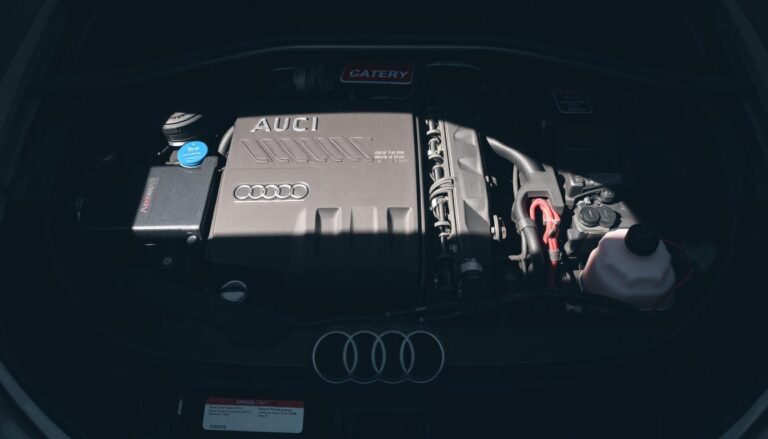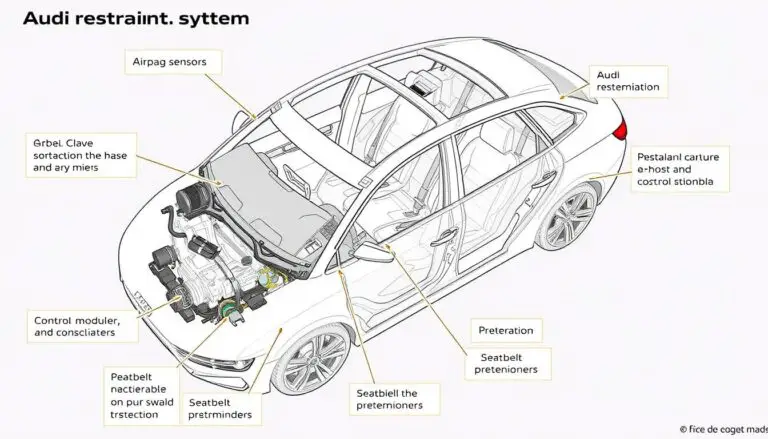The Audi 3.0 V6 TFSI Engine has garnered significant attention in the automotive world for its impressive performance and advanced technology.
As a key component in various Audi models, the 3.0 V6 TFSI Engine is known for its powerful output and efficient fuel consumption. It, like any complex engine, has its share of reliability concerns and common issues that owners should be aware of.
This article aims to provide an in-depth examination of the engine’s reliability, exploring its strengths, weaknesses, and what factors contribute to its overall performance.
Key Takeaways
- Overview of the Audi 3.0 V6 TFSI Engine’s performance and features
- Common issues affecting the engine’s reliability
- Factors influencing the engine’s overall performance
- Maintenance tips to enhance the engine’s lifespan
- Comparison with other engines in its class
Overview of the Audi 3.0 V6 TFSI Engine
The Audi 3.0 V6 TFSI engine marks a pivotal leap in engine technology, marrying fuel efficiency with superior performance. It has been a pivotal component in Audi’s product lineup, propelling numerous models with its formidable performance and efficiency.
Technical Specifications and Design
The Audi 3.0 V6 TFSI engine showcases remarkable technical specifications, including a displacement of 3.0 liters and a turbocharged fuel stratified injection (TFSI) system. Its design integrates cutting-edge materials and technologies, aimed at boosting performance while minimizing emissions.

Evolution and Different Generations
The Audi 3.0 V6 TFSI engine has undergone significant evolution across various generations, with enhancements in power output, efficiency, and reliability. For example, later iterations have seen advancements in turbocharging technology and engine management systems.
Applications in Audi Vehicle Models
The 3.0 V6 TFSI engine is employed in several Audi models, including the Audi A6 and Audi A4. Its adaptability and performance capabilities render it suitable for a diverse array of vehicles, spanning from sedans to SUVs.
| Model | Power Output | Torque |
|---|---|---|
| Audi A6 | 333 horsepower | 325 lb-ft |
| Audi A4 | 340 horsepower | 369 lb-ft |
Audi 3.0 V6 TFSI Engine Reliability: A Comprehensive Analysis
The reliability of the Audi 3.0 V6 TFSI engine is a complex issue, encompassing various facets such as overall reliability ratings, longevity, and comparison to industry benchmarks. This analysis is essential for comprehending the engine’s performance and durability.
Overall Reliability Ratings
The Audi 3.0 V6 TFSI engine has received diverse reliability ratings from automotive research entities. Data from J.D. Power indicates an overall reliability rating of approximately 4 out of 5 for Audi vehicles equipped with this engine, signifying a generally positive reliability record.
Longevity Expectations
Longevity is a pivotal aspect of engine reliability. The Audi 3.0 V6 TFSI engine is anticipated to endure between 150,000 to 200,000 miles with diligent maintenance. Regular servicing and the prompt resolution of issues can significantly prolong its lifespan.
Comparison to Industry Standards
In comparison to industry benchmarks, the Audi 3.0 V6 TFSI engine demonstrates parity with, or even surpasses, its competitors in the luxury segment. A comparative analysis with other luxury brands reveals that it is on par with, if not slightly superior to, some of its competitors in terms of reliability.
Reliability Compared to Other Luxury Brands
In a comparative analysis with other luxury brands, the Audi 3.0 V6 TFSI engine is found to be reliable. For instance, a study by Consumer Reports ranked the reliability of luxury vehicles, with Audi scoring competitively.
| Luxury Brand | Reliability Rating |
|---|---|
| Audi | 4.0/5 |
| BMW | 3.8/5 |
| Mercedes-Benz | 4.2/5 |
Reliability Compared to Previous Audi Engines
Compared to previous Audi engines, the 3.0 V6 TFSI has shown an improvement in reliability. As noted by a
“The 3.0 V6 TFSI engine represents a significant step forward in terms of reliability and performance for Audi.”
This advancement is attributed to technological advancements and design improvements.

In conclusion, the Audi 3.0 V6 TFSI engine exhibits a robust reliability record, supported by its overall reliability ratings, longevity expectations, and favorable comparison to industry standards.
Common Issues and Failure Points
The Audi 3.0 V6 TFSI engine, renowned for its power and efficiency, is not immune to certain maladies. Notably, carbon buildup and timing chain tensioner failures pose significant challenges to its performance and longevity. A comprehensive understanding of these issues is imperative for the engine’s maintenance and longevity.
Carbon Buildup Problems
Carbon buildup is a pervasive issue within the Audi 3.0 V6 TFSI engine, impacting its performance and fuel efficiency. This problem arises from the engine’s direct injection system, which can precipitate the accumulation of carbon deposits on intake valves.
Causes and Symptoms
The primary cause of carbon buildup is the absence of fuel passing through the intake valves, which typically serves to clean them. Symptoms indicative of this problem include diminished engine performance, rough idling, and a decrease in fuel efficiency.
Prevention and Solutions
Prevention of carbon buildup necessitates regular maintenance, such as walnut blasting or the utilization of fuel additives designed to cleanse the intake system. In instances where the buildup is severe, professional cleaning or the replacement of affected components may be required.
Timing Chain Tensioner Failures
Timing chain tensioner failures are a common affliction, potentially leading to costly repairs if not addressed promptly. These failures can result in the timing chain jumping or breaking, leading to engine damage.
Symptoms of timing chain tensioner failures include unusual noises emanating from the engine area, and in some cases, the engine may stall or fail to start.
Oil Consumption Concerns
Excessive oil consumption is a concern for some Audi 3.0 V6 TFSI engine owners. This issue can stem from worn piston rings, valve stem seals, or other internal engine components.
Regular monitoring of the oil level and vigilance for signs of leaks can aid in the early identification of this problem.
Supercharger Mechanical Issues
The supercharger in the Audi 3.0 V6 TFSI engine is susceptible to mechanical failures, including bearing failures and belt slippage. These issues can result in diminished engine performance and potentially cause further damage.
“Regular maintenance of the supercharger system is crucial to prevent mechanical failures and ensure optimal engine performance.”
PCV System Failures
Failures in the Positive Crankcase Ventilation (PCV) system can lead to increased oil consumption, sludge buildup, and other engine problems. Symptoms include oil leaks and decreased engine performance.
| Issue | Causes | Symptoms | Solutions |
|---|---|---|---|
| Carbon Buildup | Direct injection system | Reduced performance, rough idling | Walnut blasting, fuel additives |
| Timing Chain Tensioner Failures | Worn tensioner | Unusual noises, engine stalling | Replacement of tensioner |
| Oil Consumption | Worn piston rings, valve stem seals | Low oil levels, leaks | Regular oil checks, repair of leaks |
Maintenance Requirements and Costs
Unlocking the Audi 3.0 V6 TFSI engine’s full potential necessitates regular maintenance, averting the specter of exorbitant repairs. A meticulously maintained engine not only prolongs its lifespan but also preserves the vehicle’s performance and fuel economy.
Recommended Service Intervals
Audi stipulates that the 3.0 V6 TFSI engine should undergo servicing every 12,000 to 15,000 miles, or annually, whichever is sooner. This regimen encompasses oil changes, filter replacements, and the meticulous examination of pivotal components such as the timing chain and tensioner.
Preventative Maintenance Strategies
Preventative maintenance is paramount in circumventing extensive repairs. Essential strategies include the consistent use of high-quality synthetic oil for oil changes, vigilant monitoring for wear on the timing chain and tensioner, and the immediate resolution of any detected issues.
Average Repair Costs
The cost of repairing the Audi 3.0 V6 TFSI engine can fluctuate significantly, contingent upon the complexity of the repair. For instance, the replacement of the timing chain tensioner may range from $500 to $1,000, whereas more intricate repairs, such as supercharger replacement, can surpass $2,000.
DIY Maintenance Possibilities
DIY aficionados can undertake tasks like oil changes and air filter replacements. Yet, more intricate endeavors necessitate specialized tools and a profound understanding, prompting the advisability of professional intervention.
Finding Qualified Technicians
Securing the services of a qualified technician, well-versed in Audi engines, is imperative. Opt for certified mechanics at authorized Audi dealerships or esteemed independent shops with a specialization in European vehicles.
Performance Characteristics and Benefits
The Audi 3.0 V6 TFSI engine, a paragon of technological advancement, merges unparalleled power with exemplary efficiency. It stands as a quintessential element within Audi’s performance-centric portfolio, presenting a harmonious synergy of potency, torque, and fuel economy.
Power and Torque Output
The Audi 3.0 V6 TFSI engine is endowed with the capability to generate up to 340 horsepower and 369 lb-ft of torque, positioning it amongst the vanguard of its class. This formidable performance empowers Audi vehicles to accelerate with alacrity and precision, whether engaging in high-speed merges or ascending formidable inclines.
Fuel Efficiency
Conversely, the 3.0 V6 TFSI engine’s prowess extends to its fuel efficiency, a testament to Audi’s commitment to practicality. It achieves an EPA-estimated 22 MPG combined in select models, rendering it an ideal choice for everyday use.
| Specification | Value |
|---|---|
| Power Output | 340 horsepower |
| Torque Output | 369 lb-ft |
| EPA Estimated MPG | 22 MPG combined |
Driving Experience
The 3.0 V6 TFSI engine elevates the driving experience through its responsive and refined power delivery. It excels whether cruising on the highway or navigating complex routes, offering the requisite power and agility.
Tuning Potential and Aftermarket Support
For aficionados, the 3.0 V6 TFSI engine presents a substantial tuning potential. Backed by a robust aftermarket support network, owners can explore a myriad of performance enhancements to augment their vehicle’s prowess.
Comparison with Competitor Engines
An examination of the Audi 3.0 V6 TFSI engine’s reliability necessitates a comparative analysis with other high-performance engines, notably BMW’s N55/B58 and Mercedes-Benz’s M276.
BMW N55/B58 Inline-6 Engines
BMW’s N55 and B58 engines are celebrated for their performance and reliability. The N55, a turbocharged inline-6, has encountered challenges with its twin-scroll turbocharger. In contrast, the B58 has demonstrated greater robustness, albeit with some concerns regarding the high-pressure fuel pump. The Audi 3.0 V6 TFSI engine, on the other hand, faces its own set of challenges, including carbon buildup and timing chain tensioner failures.
Mercedes-Benz M276 V6 Engine
The Mercedes-Benz M276 V6 engine has grappled with issues related to camshaft adjusters and oil leaks. Despite these significant concerns, Mercedes-Benz has implemented updates to mitigate some of these problems. In comparison, the Audi 3.0 V6 TFSI engine’s reliability is impacted by its supercharger’s mechanical integrity and PCV system failures.
Reliability Advantages and Disadvantages
Each engine presents a unique set of reliability advantages and disadvantages. BMW engines are celebrated for their robust design but are susceptible to specific component failures. The Mercedes-Benz M276 has encountered mechanical issues, yet updates have alleviated some of these problems. The Audi 3.0 V6 TFSI engine, while facing its own reliability concerns, benefits from Audi’s efforts to enhance its design and address known issues.
The selection between these engines is influenced by a multitude of factors, including maintenance history, driving conditions, and individual priorities regarding performance and reliability.
Conclusion: Is the Audi 3.0 V6 TFSI Engine Worth It?
The Audi 3.0 V6 TFSI Engine represents a confluence of power and efficiency, albeit with inherent reliability challenges. Adequate upkeep can significantly alleviate these concerns.
Assessing the value of the Audi 3.0 V6 TFSI Engine necessitates a consideration of its formidable performance and commendable fuel economy. Yet, prospective buyers must also factor in the potential for maintenance expenses and prevalent issues like carbon buildup and timing chain tensioner failures.
In summary, the Audi 3.0 V6 TFSI Engine stands as a viable option for those desiring a synergy of performance and opulence. Its reliability profile, while subject to certain caveats, remains generally favorable, contingent upon diligent maintenance. The decision to acquire a vehicle equipped with this engine should be informed by a comprehensive appraisal of its attributes and potential drawbacks.
FAQ
What are the common issues with the Audi 3.0 V6 TFSI Engine?
The Audi 3.0 V6 TFSI Engine is plagued by carbon buildup, timing chain tensioner failures, and oil consumption issues. Supercharger mechanical problems and PCV system failures also pose significant challenges.
How reliable is the Audi 3.0 V6 TFSI Engine?
The reliability of the Audi 3.0 V6 TFSI Engine is subject to variation, with reliability ratings provided by automotive research firms. It is crucial to consider longevity expectations and compare them to industry standards.
What are the recommended maintenance intervals for the Audi 3.0 V6 TFSI Engine?
Audi recommends regular maintenance for the 3.0 V6 TFSI Engine, including oil changes. These tasks are essential to ensure optimal performance and prevent potential issues.
Can I perform DIY maintenance on my Audi 3.0 V6 TFSI Engine?
Yes, some maintenance tasks can be performed DIY. It is, though, imperative to comprehend the complexity of these tasks and the expertise required to avoid engine damage.
How does the Audi 3.0 V6 TFSI Engine compare to competitor engines in terms of reliability?
The Audi 3.0 V6 TFSI Engine’s reliability is on par with other luxury engines, such as the BMW N55/B58 Inline-6 Engines and the Mercedes-Benz M276 V6 Engine. Each engine has its unique advantages and disadvantages.
What are the average repair costs for the Audi 3.0 V6 TFSI Engine?
Repair costs for the Audi 3.0 V6 TFSI Engine vary widely, from routine maintenance to major repairs. Examples include replacing the timing chain tensioner or supercharger, which can significantly impact costs.
How can I find a qualified technician to work on my Audi 3.0 V6 TFSI Engine?
To locate a qualified technician, seek out certified Audi mechanics or reputable repair shops with Audi experience. Online reviews and ratings can help ensure reliable service.
What are the benefits of the Audi 3.0 V6 TFSI Engine’s performance characteristics?
The Audi 3.0 V6 TFSI Engine strikes a balance between power, torque, and fuel efficiency, making it versatile for various driving conditions. Its tuning potential and aftermarket support also appeal to enthusiasts.


